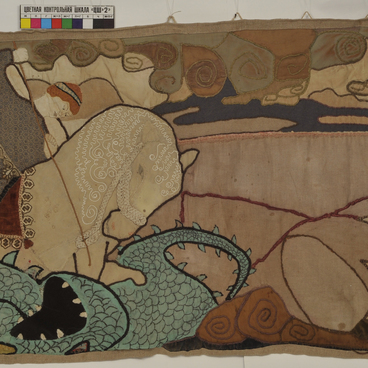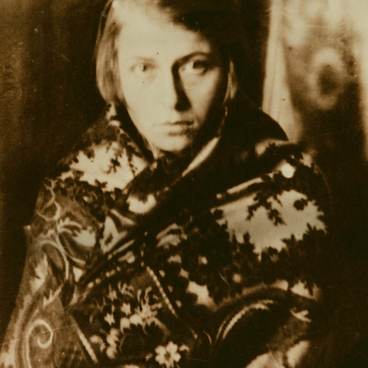In 1921, Sergei Esenin wrote Pugachev, a drama poem that received mixed reviews from contemporaries. In the book, the poet brought together historical facts (a chronicle of Pugachev’s Rebellion) and imaginist innovations in the poetic domain (imaginism is a Russian avant-garde poetic movement based on images). Esenin’s closest friends and colleagues were really impressed with the poem. In particular, poet Anatoly Marienhof noted that ‘his ideology was packed into rhymes that were written with real mastery and a good taste.’
Theatre figure Ilya Shneider, who worked together with Yesenin’s wife Isadora Duncan at her dance school, recalled: “Esenin had been working on Pugachev a lot, during a long time and very thoroughly. He loved his Pugachev and was absorbed in it. Even before finishing his work on the poem, he bustled about publishing it as a separate book and repeatedly went to the publishing house and the printing office and called there. Once he burst into [our office] on Prechistenka Street, triumphant, with a pack of thin books of a dark brick colour, just recently bound together. The title, imprinted in straight thick letters, read: Pugachev.”
Esenin arranged the first public readings of his poem in the cafe Pegasus Stables and in the Press House. According to poet Vladimir Kirillov, who was there, “Esenin recited very well, engaging the audience by his reading skill. The poem was a success. Everyone who rated Pugachev noted the poem”s artistic merits and its ground-breaking nature.”
Poetess Nina Gratsianskaya recalled: “He proudly told me how he had been working on the drama poem Pugachev, how many materials and books he had read. He showed me scars on his palms: “When I read Pugachev aloud, I squeeze my fists so hard that my palms bleed”. Pugachev is certainly one of Esenin’s favourite works, in which he put all his creative passion.’
As Esenin wrote the poem, he studied everything he could find on Pugachev’s rebellion. Author Valentin Volpin once witnessed such thorough studies: ‘When I visited Yesenin that time, I saw several books on Pugachev on the table in Esenin’s room. Obviously, those were materials for his tragedy. And what kind of books they were! Four or five cheap popular books, with margins covered by Esenin’s distinctive writing, where every letter stood separately like a soldier who lost his position in a formation.’
The foretitle of this book contains Yesenin’s autograph in blue pencil: “To Dear G.I. Svetly from your friend, S. Esenin. 3 January 1922, Moscow.” Georgy Svetly was a poet and Chairman of the Turkestan Division of the All-Russian Union of Poets. He had met Yesenin in Tashkent is May 1921.
Theatre figure Ilya Shneider, who worked together with Yesenin’s wife Isadora Duncan at her dance school, recalled: “Esenin had been working on Pugachev a lot, during a long time and very thoroughly. He loved his Pugachev and was absorbed in it. Even before finishing his work on the poem, he bustled about publishing it as a separate book and repeatedly went to the publishing house and the printing office and called there. Once he burst into [our office] on Prechistenka Street, triumphant, with a pack of thin books of a dark brick colour, just recently bound together. The title, imprinted in straight thick letters, read: Pugachev.”
Esenin arranged the first public readings of his poem in the cafe Pegasus Stables and in the Press House. According to poet Vladimir Kirillov, who was there, “Esenin recited very well, engaging the audience by his reading skill. The poem was a success. Everyone who rated Pugachev noted the poem”s artistic merits and its ground-breaking nature.”
Poetess Nina Gratsianskaya recalled: “He proudly told me how he had been working on the drama poem Pugachev, how many materials and books he had read. He showed me scars on his palms: “When I read Pugachev aloud, I squeeze my fists so hard that my palms bleed”. Pugachev is certainly one of Esenin’s favourite works, in which he put all his creative passion.’
As Esenin wrote the poem, he studied everything he could find on Pugachev’s rebellion. Author Valentin Volpin once witnessed such thorough studies: ‘When I visited Yesenin that time, I saw several books on Pugachev on the table in Esenin’s room. Obviously, those were materials for his tragedy. And what kind of books they were! Four or five cheap popular books, with margins covered by Esenin’s distinctive writing, where every letter stood separately like a soldier who lost his position in a formation.’
The foretitle of this book contains Yesenin’s autograph in blue pencil: “To Dear G.I. Svetly from your friend, S. Esenin. 3 January 1922, Moscow.” Georgy Svetly was a poet and Chairman of the Turkestan Division of the All-Russian Union of Poets. He had met Yesenin in Tashkent is May 1921.


